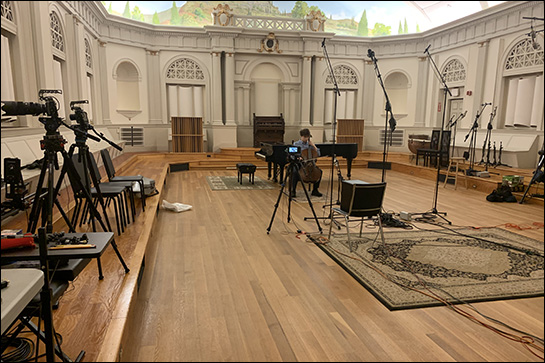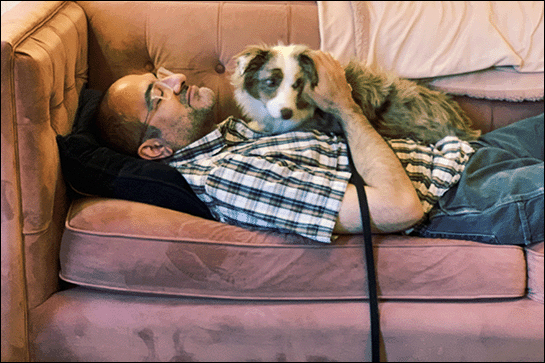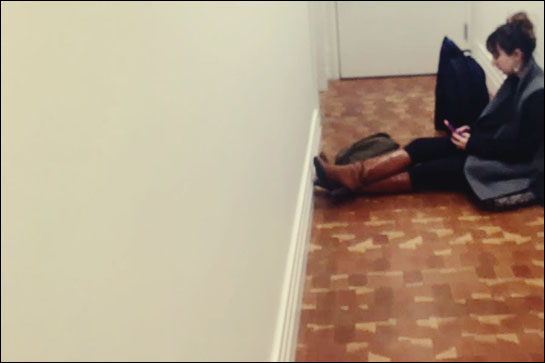Key to accepting a difficult reality? Let go of judgments

Z is recording Bach. Fifteen minutes earlier he lost his music which is normal for him. When he was six years old his teacher could change a bowing pattern right before a performance and he’d remember just fine. Now, at 16, he can’t remember a bowing pattern even if he checks it right before he records. He knows that it’s because of his brain injury, and he tries to be patient with himself. But losing the music is more difficult.
He gets angry at himself for how often he loses things. I tell him people with traumatic brain injuries who get frustrated with their brain adapt more slowly. Still, he needs a throwaway take for the anger he has at himself. I used to be a good cello mom: hovering, micromanaging, coyly intrusive. Today I tell him to tuck in his shirt but I find myself backing away as he gets ready to play so my doubts don’t infect his best efforts.
One of us has to back away first.
I sit in the sound booth listening for ways I could have helped him practice the Prelude better. Then I tell myself not to judge myself. Before the Allemande is finished I have time to judge myself for how much I keep judging myself and wonder if I’m hindering Z’s ability to stop self-judgment. He finishes with a flourish then dashes out the door and down the stairs.
The sound guy looks at me.
“He’s going to throw up,” I tell him. “Head injury. Too much sound for him in one sitting.”
Z comes back up. Nods to the sound guy and walks back to the cello.
He left his glasses in the bathroom. I go get them.
At home he takes a nap while I tell him the research on traumatic brain injuries is that being honest about the prognosis is important to moving forward.
“I know your therapist said I should let you come to terms on your own timeline, but it’s time. After eighteen months, a brain injury that has not healed will not heal. We have a new baseline for you.”
“It’s okay mom. I think that therapist was better at helping me with anxiety than long-term planning.”
I hug him and notice how this went smoothly because I was patient. I need to remember that.
We mark the moment like good Bostoners with a trip to Dunkin Donuts. I open the door but he turns away. He can’t go in. He is crying.
Back at our apartment he says he wants to work on his college essays. Not that he is anywhere near applying to college. If you ask him, he’ll tell you his ability to focus hovers somewhere between goldfish and Alzheimers. But he is still goal oriented, and if he is going to write anything down, he wants to have a purpose. Not that he’s writing. I’m taking dictation:
“My head injury has made an impact on my ability to want to succeed and my want is to just get better. Because it feels hopeless in the sense that there can be a recovery. It’s hard to differentiate if I’m getting better or lying to myself. That makes it impossible to do anything. So I just get through the day.”
I tell him I’m happy to be able to write that down. I think a lot of people feel like that after trauma — that trying to get better is pointless.
Then he lays on the sofa to sleep because he basically gets a headache every 3-5 hours of life.
I get the urge to go to my garden every 3-5 hours of life, but I tell myself I am not allowed to leave him alone when he’s so sad. How do I squelch the urge to run far away from any problem except the problem of finding the right pink shade of daffodil? Buy more daffodils, of course. It’s late in the season, but I’m a persistent shopper.
After a thrifty hour on Easy to Grow the dog is whimpering so much that Z begs me to take her out so he can have alone time. Now I am not running away. Now I am providing good solid caretaking for both the child and the dog. I grab three bags of Tazetta daffodils which I have decided can now grow in the north because of global warming.
I dig ferociously to plant 150 bulbs before the dog gets tired of fetching sticks. But my anxiety is contagious and she starts digging next to me, uncovering the bulbs faster than I can resettle them. Somehow she brings up a King Alfred bulb. I toss it, she fetches and I have just enough time to bury all bulbs in sight.
At home Z has not moved from the sofa. I am covered in dirt. And I’m not sure which of us is functioning more like a person with a head injury.



Penelope- my heart aches for Zehavi. Please tell him that Cooper and i are thinking of him and holding him in our hearts. I miss you. You were always someone real that i loved engaging with.
I always say the same thing. I love your writing. You and your son are doing incredibly well, given the choices. Keep on truckin’, and playing, writing, and planting.
Dear Penelope, is Zehavi playing the first cello suite? I know it almost by heart on classical guitar. Zehavi is a hero, and so are you.
Here’s a website that may be helpful
https://nafme.org/still-making-music-how-students-with-traumatic-brain-injury-can-continue-with-musical-activities/
I also experienced multiple head injuries and it affected my balance, epilepsy, short term memory issues, and slept a lot. (I am an abuse survivor and later as an adult was assaulted).
Recovery was long. I learned a few things about head injuries. Some I wish I knew better and maybe could have helped my daughter more when she dealt with her own head trauma.
If you haven’t already get him not just an MRI but also an FMRI . FMRI will real be helpful.
Blueberries improve memory by 30%.
Children’s aspirin one per day improves blood flow (including the brain).
The brain needs oils (good fats) for better function.
Hemp oil reduces inflammation, virtually eliminates anxiety and helps with rest. Under the tongue before bed.
The book “The Lies We Tell” ( an old book written in the 70’s which I can’t seem to find online but will keep looking) is about how sometimes we don’t know what we know, about perception, the conscious and subconscious.
I knew I was going to be ok when I wrote a theory and upon reading it I recognized it as something I had written previously. I started to cry. I couldn’t even follow through in putting on a headphone, turning on the radio, choosing a radio channel to listen to without stopping as if the task was complete after every step only to realize it wasn’t. Yet my abstract thinking was in better shape.
But you know what? My math skills improved so much that I switched careers from real estate to bookkeeping then to technology .
It’s not gone, it’s not over and even now years later it has improved.
Oh and measure his blood pressure and oxygen levels, especially oxygen levels.($20 for the item to measure heart rate and oxygen levels). Maybe his nausea and headaches have to do with it.
I understand some sounds and some lights cause nausea for me still.
I’ve noticed auditory processing issues and balance issues getting worst lately. I am losing my hearing and began learning ASL.
But using Garbage band software and instruments and learning to “play” and experiment without fear of failure he can thrive.
Billie Eilish and her brother as an example of what can be accomplished with play and experimentation with software like garage band. Billie Eilish has turrets.
College can wait another year.
*hugs*
Sending lots of encouragement to Z. I lived for 3.5 decades not knowing I had extreme trauma from my childhood and those memories are just not anywhere present in conscious memory. One common theme I noticed throughout my unknowing and now knowing recovery is just that my instincts were way better than I could consciously understand.
I’d encourage Z to lean into his instincts, it is fascinating how many of my abusers my body KNEW I should avoid despite me not having any conscious reason to. Similar for recovery, needing to take 6 months off, be meticulous about “seemingly” strange habits. They all had a reason, that makes sense now but didn’t at the time. I’ve been able to progress my recovery and run a company from 3 employees to 10.
I also found great comfort in reading the Torah, YHWH does amazing things in these situations!
Its been a while since I visited your blog. My heart breaks from knowing the struggles of Zehavi. But know that he will succeed and be alright. I love reading your blog, as always.
That’s a horrible worry to endure as a parent, and an awful thing for Zehavi to come to terms with. Of course, you will both come to terms with it, whichever way things turn out.
Please say “hi” to Zehavi from me. He’s such a bright boy. I always enjoyed reading my pieces to him and particularly the short debate we had around what it is to be a man.
Strength to you both.
You have such a gift.
(Insert a long list of adjectives here praising your ability to communicate)
That you make me feel sorrow and joy at the same time is like a drug.
I enjoy your stuff. Thank you.
Hi Penelope,
I highly recommend you read the book ‘Superbetter’ By Jane McGonigal (if you haven’t already) The author Jane created the book to document her own journey recovering from brain injury and how gamification helped her to do so. She has now amassed tens of thousands of ‘Superbetter players’ who have used her book/technique to recover from trauma, or pursue a life goal.
P.S – On another note, I was watching the below video earlier and thought of what you always say regarding there being a correlation between autistic women on the spectrum being attractive:
https://www.bbc.co.uk/programmes/p0b5mh1q
Your blog post was both heartbreaking and inspiring. As a mom I ache for you having to deal with both your son’s unhappy struggle and your inability to fix the real problems that life sometimes presents. I am inspired by your sharing of ways that you cope and how he trudges on, refusing to be defeated. My husband has Aspberger’s, and your many posts have helped us be happy in our marriage despite ongoing challenges. For me it is like a faun moved in and is sharing my life with me. We try to adapt to each other and with constant work and a lot of kindness are mostly successful. Thank-you!
I just wanted to encourage your son that 2 years after I had a traumatic brain injury and after seeing so many pts, drs, chiropractors I finally found someone who did help me. She is a PT who relieved my daily headaches through craniosacral therapy and integrative manual therapy. At almost 3 years from my TBI now I still have issues but with much less chronic pain which makes life easier. My noise sensitivity is much better than it was, but still sometimes an issue. Singing bowls helped that issue along with the PT. My memory is not the greatest but I don’t forget things that just happened now. I am still a work in progress and still going to PT. Keep seeking and looking for help. Don’t give up and listen to drs who say nothing can be done! Look for people who think outside the box and want to help you. Don’t give up or believe this is how you will be forever. There is hope!! Sending positive vibes >
Integrative manual therapy is what I was going to recommend as well! It’s amazing stuff. I go to one inNorthbrook, IL. Also in Northbrook, Dr. Zelinsky, developmental optometrist, works wonders with TBI. See the book The Ghost in My Brain by Clark Elliott for more info on her. Good luck Penelope and Z!